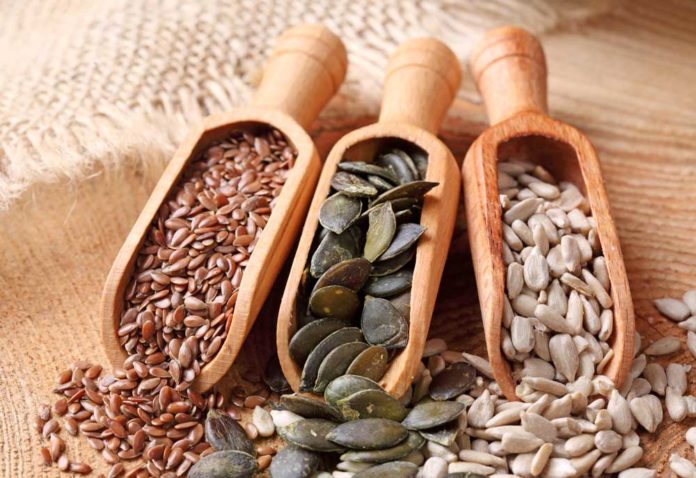9 Healthy and Best Seeds to Eat
1. Hemp Seeds
Individuals tend to worry about the safety of hemp, although their intake is safe and considerably encouraged. From their use in cooking, acting as a moisturizer, and treating the hair and scalp, you do not want to miss out on these beneficial uses! Find more uses and benefits of hemp seeds here.
2. Chia Seeds
While their claim to fame may have stemmed from a plant pet, their role in health are extremely acknowledged today. From their large volume of omega-3 fatty acid content to their significant fiber content, the small (but mighty) chia seeds are shown to offer these five health benefits.
3. Pumpkin Seeds
From pumpkin pie to the infamous PSL (or pumpkin spice latte), pumpkin continues to boast each fall season. Although pumpkin is nutritious on its own, its mostly forgotten seeds bares attention. And with these 13 health benefits of pumpkin seeds and recipe ideas you may be wondering, “PSL, who?”
4. Flaxseeds
Flaxseeds are not new to the food scene. The seeds are well known for their contribution of fiber and omega-3 fatty acids, ultimately promoting good heart health. Interestingly, too, the seeds are an integral component of chicken feed, subsequently heightening the omega-3 level within their laid eggs. Flaxseeds may also lessen the likelihood of developing cancer, diabetes, and even hot flashes.
5. Sesame Seeds
Though commonly known on the top of a hamburger bun, sesame seeds have been used for medicinal purposes for thousands of years. The seeds are rich in nutrients and may reduce the risk of diabetes, hypertension, cancer, and other chronic diseases. Get more comfortable with sesame seed’s use at the Food Network’s blog.
6. Pomegranate Seeds
The rich, ruby color of pomegranate seeds appeal to much more than the eye, as they are internally loaded with powerful antioxidants. Consuming the seeds has shown promise in improving digestion, fighting against cancer, relieving arthritis pain, promoting anti-aging that are further described here.
7. Sunflower Seeds
Along with being known for their healthy fat content, sunflower seeds are also recognized as the richest source of vitamin E. Acting as a powerful antioxidant, vitamin E has been implied to protect against accelerated aging, cataracts, Alzheimer’s disease, and diabetes. Top salads, add crunch to yogurt, enhance flavor of stir-fries, and combine into trail mix.
8. Quinoa
Although this superseed resembles cereals and grains, quinoa is surprisingly more related to spinach and beets. This superseed is known for its remarkable protein content, eight grams per cup, along with amino acids and a plethora of vitamins and minerals. Quinoa offers a nutty flavor and can take the place of rice or pasta in a number of dishes, including this bistroMD’s original quinoa and pumpkin seed stuffed acorn squash recipe!
9. Wheat Germ
Wheat products are continuously encouraged over white, refined products, and mostly related to wheat germ. Wheat germ, or the cereal germ, is the most nutrient-dense portion of the wheat kernel and generally absent in white flours and their products. The rich supply of fiber, vitamins, and minerals it supplies protects against chronic diseases, including cardiovascular disease, diabetes, and cancer.






